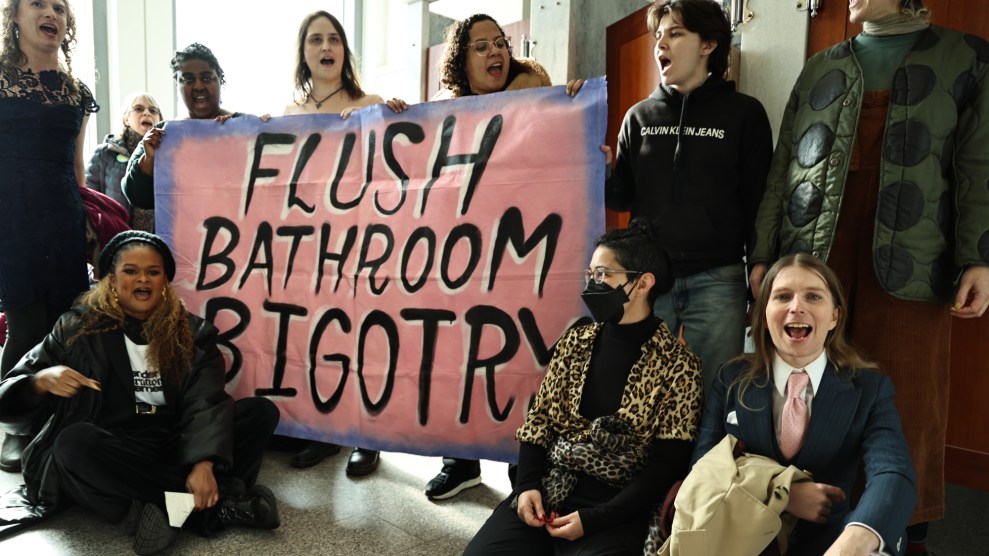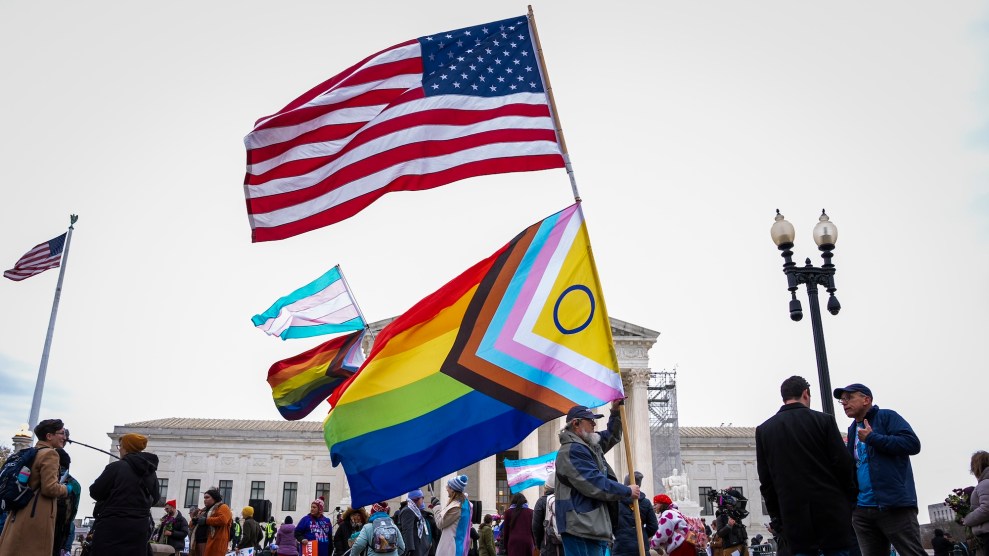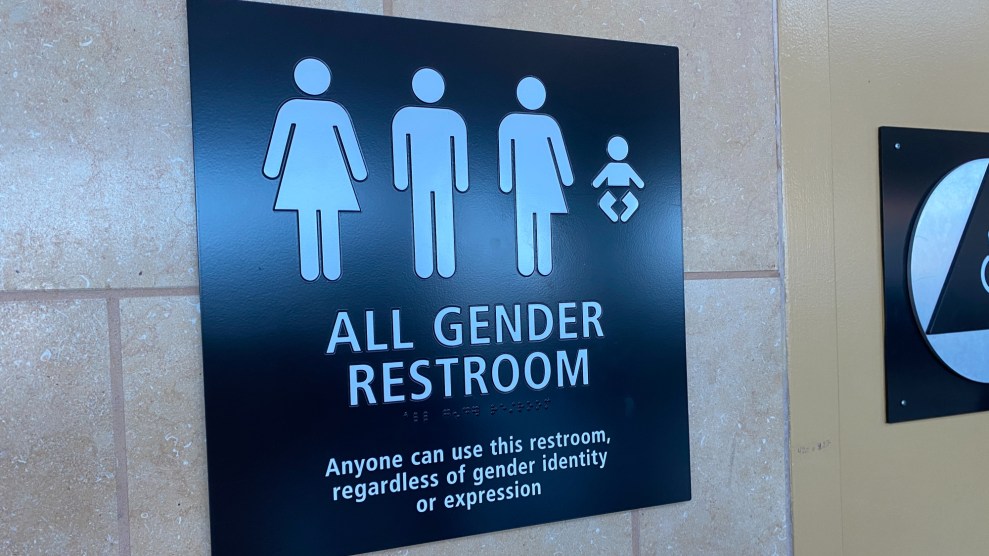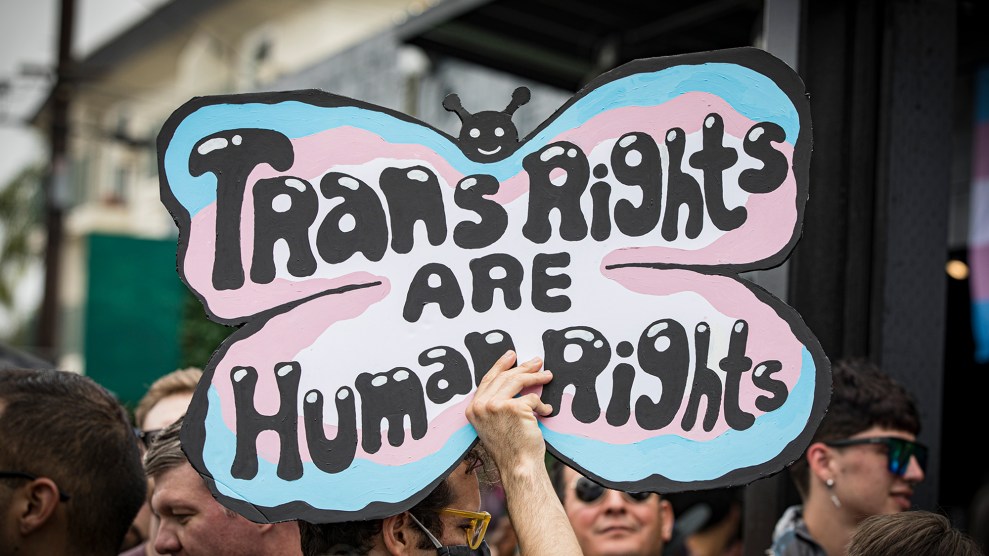
Protesters occupy a bathroom near House Speaker Mike Johnson's office.Courtesy Alexa B. Wilkinson
Protesters took to the US Capitol bathrooms across from House Speaker Mike Johnson’s office on Thursday to protest the recently enacted policy banning trans people from accessing bathrooms that align with their gender identity. Just a day after the Supreme Court heard oral arguments in a case that may upend gender-affirming care for children and adults across the United States, dozens of trans people and their allies raised banners demanding Congress “stop pissing on our rights” and urging supporters to “flush bathroom bigotry.”
“It was important to show up in a radically defiant way and let the world know, and let our electeds know, that we are not going to allow this disrespect and this disregard for our lives,” Raquel Willis, co-founder of Gender Liberation Movement and one of the organizers of the demonstration, told Mother Jones. “Trans folks deserve access to the restrooms like anyone else.”
Organizers said about 15 people were arrested for crowding and obstructing, including Willis and Chelsea Manning, the whistleblower who leaked troves of classified government records about Iraq and Afghanistan to WikiLeaks. According to The 19th, Capitol police threatened protesters with sexual misconduct charges, although a Gender Liberation Movement spokesperson said no such charges were filed.

The demonstration, which Willis said was inspired by civil rights sit-ins of the past, was in response to the efforts spearheaded by Rep. Nancy Mace, a South Carolina Republican who, weeks after the election, vowed to propose a trans bathroom ban to target the first openly trans person elected to Congress, Democrat Sarah McBride from Delaware. After Speaker Johnson announced that bathroom access would be restricted—which he did on the Trans Day of Remembrance—Mace went still further, announcing that the ban she proposed would be extended to include all federal property, including museums and national parks. “Oh you thought threatening me would silence me?” Mace wrote in a post on X. “No. I just doubled down and filed a new bill to protect women and girls across the entire country on all federal property everywhere.”
After the protest, Mace called protesters an anti-trans slur in an X post.
“These attacks aren’t just about trans people. These are attacks that will be continued, that will be utilized against other communities on the margins.”
“Every person deserves dignity and respect, both in daily life and in more symbolic places like the US Capitol,” Manning, whose sentencing for leaking classified information was commuted by then-President Barack Obama after a seven-year imprisonment, said in a statement. “As someone who has fought against similar rules, I know what it’s like to feel pushed aside and erased. But I also know the incredible power and resilience our community has.”
Trans bathroom ban proposals have proliferated across the United States, with 14 states enacting restrictions since 2021, according to the Movement Advancement Project. Most recently, Ohio enacted a bathroom ban encompassing all K–12 schools and colleges, affecting trans students’ access not only to school restrooms but also to university dormitories.
Proponents of the bans, including Mace, argue that they’re necessary to protect the safety of women and girls from would-be assaulters. Researchers, however, have found no link between trans-inclusive bathroom policies and safety risks. In fact, research shows that trans people face greater risk of sexual harassment and assault when restrictive bathroom policies are in place. Even without such bans, trans people already face a disproportionate risk of violence, particularly sexual violence.
Willis said that as attacks on trans rights escalate, it is critical that allies—including Democratic elected officials—push against anti-trans policies and rhetoric. She described Democrats as “missing in action” while a coordinated wave of anti-trans legislation has spread across states since 2021. “These attacks aren’t just about trans people,” she said. “These are attacks that will be continued, that will be utilized against other communities on the margins.”
















